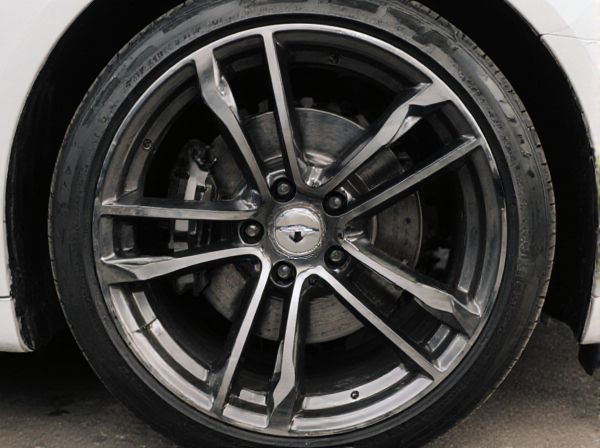
Photo illustration: Forged vs Cast Wheel
Forged wheels offer superior strength and durability due to their manufacturing process, which involves compressing aluminum into a solid form under high pressure. Cast wheels are produced by pouring molten metal into a mold, resulting in a more affordable option but with reduced strength compared to forged wheels. Your choice depends on whether you prioritize performance and weight savings or cost-effectiveness for everyday driving.
Table of Comparison
| Feature | Forged Wheel | Cast Wheel |
|---|---|---|
| Manufacturing Process | High-pressure forging of aluminum or alloy | Pouring molten metal into molds |
| Strength | Superior tensile strength and durability | Lower strength, prone to cracking under stress |
| Weight | Lighter, improving performance and fuel efficiency | Heavier, resulting in reduced acceleration and braking |
| Cost | Higher due to complex process and materials | More affordable and widely available |
| Design Flexibility | Limited but precise shapes | Highly versatile and complex designs possible |
| Repairability | Easier to repair after damage | Harder to repair, often requires replacement |
| Performance Use | Preferred for racing and high-performance vehicles | Suitable for everyday driving and budget options |
Introduction to Forged and Cast Wheels
Forged wheels are manufactured by compressing a solid billet of aluminum under extreme pressure, resulting in a denser, stronger, and lighter structure compared to cast wheels, which are created by pouring molten aluminum into molds. The forging process aligns the metal grains, enhancing durability and performance, whereas cast wheels may have internal voids or weaknesses due to the cooling process. Forged wheels are preferred for high-performance vehicles due to their superior strength-to-weight ratio, while cast wheels are commonly used in everyday driving for cost efficiency.
Understanding Wheel Manufacturing Processes
Forged wheels are produced by applying extreme pressure to a solid billet of aluminum, resulting in a denser, stronger structure with enhanced durability and reduced weight compared to cast wheels. Cast wheels are created by pouring molten aluminum into molds, allowing for intricate designs but often leading to higher porosity and lower strength. The manufacturing process significantly influences performance, with forged wheels offering superior strength-to-weight ratios ideal for high-performance and luxury vehicles.
Key Differences Between Forged and Cast Wheels
Forged wheels are created by compressing high-quality aluminum billets under extreme pressure, resulting in superior strength, reduced weight, and increased durability compared to cast wheels, which are produced by pouring molten aluminum into molds. The manufacturing process of forged wheels enhances grain structure and structural integrity, offering better performance and resistance to impact and fatigue. Cast wheels, while more affordable and easier to manufacture in complex designs, generally lack the strength-to-weight ratio and longevity found in forged wheels, making them more prone to cracking under extreme stress.
Strength and Durability Comparison
Forged wheels exhibit superior strength due to their unique manufacturing process that compresses and aligns aluminum grains, resulting in a dense, hard material structure resistant to cracks and bends. Cast wheels, produced by pouring molten metal into molds, tend to have a more porous internal structure, making them generally less durable under heavy stress or impact. The higher tensile strength of forged wheels translates to enhanced durability and longevity, especially in high-performance and off-road applications.
Weight Considerations in Forged vs Cast Wheels
Forged wheels typically weigh 20-30% less than cast wheels due to their manufacturing process, which involves compressing aluminum billets under high pressure, resulting in a denser and stronger structure. This reduced weight improves acceleration, braking, and overall vehicle handling by lowering unsprung mass. Cast wheels, formed by pouring molten metal into molds, are heavier and less rigid, which can negatively impact performance and fuel efficiency.
Performance Impact on Vehicles
Forged wheels offer superior strength-to-weight ratios compared to cast wheels, resulting in reduced unsprung mass that enhances acceleration, braking, and handling precision. The denser metal structure of forged wheels improves impact resistance and fatigue life, allowing for better performance under high-stress driving conditions. Cast wheels, being heavier and less rigid, may negatively affect vehicle dynamics and fuel efficiency, making forged wheels the preferred choice for performance-focused vehicles.
Cost Analysis: Forged vs Cast Wheels
Forged wheels typically cost 20-40% more than cast wheels due to their complex manufacturing process, which involves high pressure and heat to shape a solid billet of aluminum, resulting in superior strength and durability. Cast wheels are more affordable as they are produced by pouring molten aluminum into molds, allowing for mass production but less structural integrity. Despite higher upfront costs, forged wheels offer better long-term value with improved performance and reduced maintenance expenses.
Aesthetic Choices and Customization Options
Forged wheels offer sleek, intricate designs with sharper detailing, making them ideal for high-end aesthetic customization and personalized finishes. Cast wheels provide a broader range of shapes and sizes at a lower cost, allowing more accessible but less detailed styling options. Custom paint jobs, engravings, and color accents are more precise on forged wheels due to their superior material integrity and manufacturing process.
Common Applications and Use Cases
Forged wheels are commonly used in high-performance vehicles and motorsports due to their superior strength-to-weight ratio and enhanced durability under extreme stress. Cast wheels are popular in everyday passenger cars and SUVs, offering cost-effective solutions with a variety of designs suitable for standard driving conditions. Both types find applications in aftermarket customization, with forged wheels preferred for weight reduction and improved handling, while cast wheels are favored for budget-friendly upgrades.
Choosing the Right Wheel: Factors to Consider
Choosing the right wheel involves evaluating key factors such as weight, strength, and cost, with forged wheels offering superior strength and lighter weight due to their manufacturing process, while cast wheels are more affordable but heavier and less durable. Vehicle application and driving conditions heavily influence wheel selection, where forged wheels excel in high-performance or off-road scenarios, and cast wheels suffice for daily commuting. Tire size compatibility and maintenance requirements also play crucial roles in ensuring optimal performance and safety.
 caratoz.com
caratoz.com